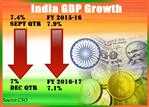
India's economy expanded at a slower pace in the three months to December, but remained the fastest growing among major economies, despite the damping effect of the government's shock move of currency demonetization implemented in November.
Gross domestic product rose an annual 7 percent in the three months to December following 7.4 percent growth in the September quarter, preliminary data from the Central Statistics Office showed Tuesday. Economists had expected a sharp slowing to 6 percent due to the hardships that Indians faced due to demonetization.
India thus retained its lead over China, which grew 6.8 percent during the three months to December.
The CSO also estimated 7.1 percent growth for the financial year ending March 31, thus retaining the earlier estimate provided in January. In the fiscal 2015-16, growth was 7.9 percent.
The drastic move to remove high value currency notes of INR 1,000 and INR 500 from circulation without warning had caused a severe cash crunch in India for several weeks. The government hopes to eliminate the cash squeeze through "remonetization" by April.
Early February, the Reserve Bank of India decided to change its policy stance from 'accommodative' to 'neutral' while keeping interest rates on hold to assess whether the effects of demonetization would indeed be transitory. Policymakers claimed that the neutral stance will give flexibility to move in either direction.
Gross value added, a measure tracked by the RBI, is estimated to grow 6.7 percent in 2016-17 versus 7.8 percent in 2015-16, the CSO report said. The central bank in February projected 6.9 percent GVA growth for 2016-17 with risks evenly balanced around it and said the momentum would recover "sharply" in 2017-18.
Long-term effects of demonetization will surely include important gains, the OECD Director General Angel Gurria said earlier on Tuesday as he presented the group's latest India economic survey report in New Delhi.
The Paris-based think tank projected the country's GDP growth forecast for the 2016-17 fiscal year ending March 31 at 7 percent and the pace is seen to improve to 7.3 percent in the fiscal 2017-18 and then to 7.7 percent in the year after.
The OECD sought progress on many fronts, including more flexible labor laws, bank recapitalization, pricing of water and energy, easing stringent product market regulations and continuing to improve access to education.
by RTT Staff Writer
For comments and feedback: editorial@rttnews.com
Economic News
What parts of the world are seeing the best (and worst) economic performances lately? Click here to check out our Econ Scorecard and find out! See up-to-the-moment rankings for the best and worst performers in GDP, unemployment rate, inflation and much more.

